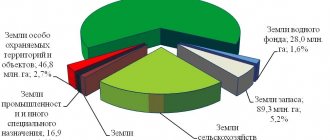Receiving an inheritance can be quite a complex matter. Especially if, in addition to the legal heirs under the will, there are other people who think that they have the right to a share in the inheritance. It may turn out that it will be easy to say goodbye to these people: just show them a copy of the will, indicating that their names are not included in it.
But it may also happen that someone answers: “I have an obligatory share in the inheritance.” In such a situation, you will have to begin the process of finding out whether these people are in fact obligatory heirs. And in this matter, the help of a qualified lawyer will be very helpful.
Do you want to figure it out, but don’t have time to read the article? Lawyers will help
Entrust the task to professionals. Lawyers will complete the order at the cost you specify
265 lawyers on RTIGER.com can help with this issue
Solve the issue >
What is a mandatory share in an inheritance?
A compulsory inheritance share is a part of the property that certain people have the right to inherit, regardless of what is written in the will. In other words, the mandatory share rule limits the people named in the will from disposing of the inherited property.
The Civil Code (Civil Code) establishes that there is a category of citizens who inherit part of the property of the testator, regardless of his will. A person may be included in the number of such necessary heirs if he has the right of inheritance, but was deprived of his share, if all the property according to the will passed to other people, or if he was bequeathed an inheritance in an amount less than the obligatory share.
Who can count on her?
Issues of inheritance are regulated by the Civil Code of the Russian Federation. According to it, if the testator did not write a will, then the shares of his property are distributed among the heirs according to the order of inheritance specified in Article 1141. In a situation where a will has been drawn up, citizens, in addition to the persons specified in the will, can claim an obligatory share in the inheritance , belonging to the category of compulsory heirs, according to Article 1149 of the Civil Code.
The number of such citizens includes minors or disabled relatives of the testator who were in his care. That is, the number of applicants for an obligatory share in the inheritance may include the children of the deceased, both natural and adopted or in care, husband or wife, parents, grandparents, sisters and brothers, and some other people. The main condition for their right to inheritance is that they are disabled.
Who is recognized as a disabled heir? This question is answered by Resolution of the Plenum of the Supreme Court No. 9: children under the age of majority, pensioners and disabled people of the first, second or third group. Also, in order for a disabled relative to be recognized as having the right to inherit a compulsory share, it is necessary to prove that he was dependent on the testator for a year or more before his death.
Another obligatory share of the inherited property may be due to a person who was not a relative of the testator, but was supported by him for a year or more and lived with him. For example, a common-law spouse.
Nuances of registering a mandatory share
If a mandatory share is allocated at the request of a pensioner, other property inherited for other reasons (for example, by law or by testamentary refusal) will be taken into account in its composition. Such situations arise if the will determines the conditions for inheriting only part of the property.
For example, if the contents of the will indicate only half of the assets of the deceased citizen, the second part will be distributed according to the law. If a pensioner is included in the first stage, he will participate in the distribution of property on an equal basis with the other heirs. If a pensioner submits an application for the allocation of a mandatory share, its composition will include the property received through inheritance by law. It must be taken into account that the renunciation of part of the inheritance distributed by law will also be taken into account when determining the size of the obligatory share.
Thus, based on the rules of part three of the Civil Code of the Russian Federation, only pensioners from the first line of heirs by law will have the right to receive a mandatory share. An exception to this rule is provided only by Article 1148 of the Civil Code of the Russian Federation - if the deceased citizen did not have close or distant relatives, the right to inheritance and compulsory share is acquired by disabled dependents (for example, the common-law wife of the deceased or other citizens who lived together with the testator at the time of his death).
Amount and allocation of mandatory share
According to the law, the obligatory share of the inheritance is 50% of the share that the heir could receive in the absence of a will. To determine the size of the obligatory share, the entire property of the testator is taken into account: both what is indicated in the will and what is not included in it. Household items - such as dishes, books and furniture - are also inheritance and must be taken into account when calculating.
In order to determine the size of the obligatory share to which a person has the right of inheritance, it is necessary to take into account other necessary heirs, even if they did not express a desire to enter into the inheritance. When the circle of heirs has been decided, you can begin simple mathematical calculations. The entire amount of the inheritance should be divided by the number of heirs, and then the resulting figure by 2, thus obtaining the size of the obligatory share in the inheritance of one person.
As for the allocation of the obligatory share, it is usually given from the property transferred by right of inheritance that is not included in the will. Part of the bequeathed property can be transferred as a compulsory share only in a situation where the other inheritance is not enough to allocate it. For example, if the testator bequeathed an apartment to you, but in addition to it you also received a car, a country plot or other expensive property, then the part for the other heir can be calculated and allocated precisely from this unwilled property.
There may also be a situation where the inheritance is the living space on which the heir lived under the will, but the person who has the right to inherit the compulsory share did not live. In such a situation, if the case goes to court, the judge may decide to reduce the mandatory share or completely refuse to allocate it. The same attitude applies to property that was used by the heir specified in the will in order to earn a living.
For example, if the deceased left behind a working workshop in which a person who has the right to inherit under a will works, and the obligatory heir does not need this workshop, the court may refuse to allocate his share of this property. When making decisions on such cases, the court often takes into account all the features of the case and analyzes the property status of the heirs.
Commentary to Art. 1149 Civil Code of the Russian Federation
1. Despite the wide range of possible heirs, freedom of testament in almost all legal systems is limited by the rules on the obligatory share in the inheritance (portio debita). This restriction is intended to preserve the minimum provision for close relatives of the testator, as well as his dependents who are recognized as needy due to their age or state of health.
The rules on the status of necessary heirs were contained in Roman law. Russian pre-revolutionary legislation did not know the concept of a mandatory share. Restrictions on freedom of will were associated with a narrowing of the circle of heirs under a will, as well as objects of property that could be bequeathed (for example, family estates could not be bequeathed to anyone other than the legal heirs), although the doctrine of that time proposed introducing this category into legislation. The institution of compulsory share was first introduced in our country during the Soviet period in 1928.
2. The essence of modern rules on compulsory share in inheritance is that there is a category of persons who inherit regardless of the will of the testator (the so-called necessary heirs) in any of the following three cases:
1) if they are deprived of inheritance;
2) if all property is bequeathed to other persons;
3) if the part of the bequeathed and intestate property due to them is less than the obligatory share.
The testator's minor or disabled children, his disabled spouse and parents, as well as the testator's disabled dependents (provided that they were dependent on the testator for one year before the opening of the inheritance) inherit, regardless of the contents of the will, at least half of the share that would have been due to each of them. them when inheriting by law (mandatory share).
For comparison, it can be noted that this share according to the Civil Code of 1922 was at least 3/4 of the share; according to the Civil Code of 1964 - no less than 2/3 of the share. The reduction in the size of the mandatory share should apparently be associated with the expansion of the principle of freedom of will.
The phrase “no less” has a practical meaning. It happens that the required heir is assigned a certain share of property in the will, but this share is less than the legal share, although not less than half. In this case, the will is fully valid, and the grounds for applying Art. 1149 Civil Code no.
3. Citizens under 18 years of age, women over 55 years of age and men over 60 years of age are considered disabled by age. Persons who got married before reaching 18 years of age, as well as emancipated persons, although they acquire full legal capacity, nevertheless have the right to an obligatory share if they have not reached 18 years of age at the time of opening the inheritance. Disabled people of groups I, II, III, including disabled people from childhood, are recognized as disabled for health reasons. The list of required heirs is formulated in the law exhaustively and is not subject to broad interpretation.
4. To calculate the size of the obligatory share, the amount of the value of the inherited property, including items of ordinary home furnishings and household items, should be divided by the number of heirs who would be called to inherit by law in the absence of a will, and half of the resulting private one should be found.
For example, a citizen bequeathed all his property to his adult, able-bodied daughter. In addition to his daughter, he also has a mother who is disabled group I. If we assume that there was no will, the inheritance would be divided between the daughter and mother (1/2 of the testator's property each). Thus, the mother’s obligatory share will be half of 1/2 of the testator’s property, i.e. 1/4 of the property. Certificates of the right to inheritance will be issued to: mother - 1/4 of all property (by law), daughter - 3/4 of all property (by will) (for other examples of calculating the obligatory share in relation to various life situations, see: Soldatenko L .G., Biryukova S.V. Heirs and inheritance. How to receive, how to transfer. Answers to all questions. M., 2007. pp. 45 - 48).
5. The current Civil Code not only reduced the size of the obligatory share, but also softened the rules on it in favor of the principle of freedom of will.
Firstly, the right to an obligatory share in the inheritance is satisfied from the remaining untested part of the estate, even if this leads to a reduction in the rights of other heirs under the law to this part of the property, and if the untested part of the property is insufficient to exercise the right to an obligatory share, from that part property that is bequeathed. To the extent that the will infringes on the heir's right to an obligatory share, it is invalid. The obligatory share includes everything that the heir entitled to such a share receives from the inheritance for any reason, including the cost of the testamentary disclaimer established in favor of such heir. Thus, first the obligatory share will reduce the share of the heirs under the law and only then the share of the heirs under the will.
6. Secondly, if the exercise of the right to an obligatory share in the inheritance entails the impossibility of transferring to the heir under the will property that the heir entitled to the obligatory share did not use during the life of the testator, but the heir under the will used for living (a residential building, apartment, other residential premises, dacha, etc.) or used as the main source of livelihood (tools, creative workshop, etc.), the court may, taking into account the property status of the heirs entitled to an obligatory share, reduce the size of the mandatory share or refuse to award it.
Both of the above conditions must be simultaneously met in order for the reduction of the mandatory share or refusal to award it to be legal. As you can see, this rule on the priority right of heirs under a will, implemented only in court, makes it possible to provide assistance to those who need it no less than the necessary heirs.
Shortly before the adoption of part three of the Civil Code of the Russian Federation, it was clarified that the provisions of the law on the right to an obligatory share in the inheritance do not exclude the right of other heirs to apply to the court to verify the grounds for recognizing the right to an obligatory share in the inheritance and to change its size taking into account the actual circumstances of a particular case (see: Determination of the Constitutional Court of September 9, 1999 N 209-O “On the refusal to accept for consideration the complaint of citizen Elena Anatolyevna Kurkina about the violation of her constitutional rights by Article 535 of the Civil Code of the RSFSR” // Vestnik of the Constitutional Court. 2000. N 2 ).
Another general basis for restricting (depriving) the rights of necessary heirs can be the recognition of them as unworthy (clause 4 of Article 1117 of the Civil Code).
7. Thirdly, comment rules. Art. are formulated in such a way that receiving a mandatory share in the inheritance is a right, and not an obligation, of the person concerned. Therefore, if the latter refuses the inheritance or does not enter into the inheritance as a necessary heir, the allocation of the obligatory share is not made. In other words, this share is “obligatory” for the testator, but not for the necessary heir.
Here it should be noted the strictly personal nature of the right to an obligatory share, which cannot be transferred to third parties either by inheritance (including hereditary transmission - clause 3 of Article 1156 of the Civil Code), or by the will of the necessary heir (including by refusal in favor of another heir - clause 1 of Article 1158 of the Civil Code).
8. From the point of view of the legal nature, the subjects of the right to an obligatory share in the inheritance are the heirs, and not the creditors who have an obligatory right of claim against the heirs under the will.






